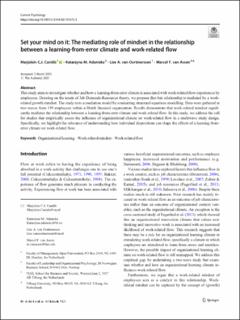| dc.contributor.author | Caniëls, Marjolein C.J. | |
| dc.contributor.author | Adamska, Katarzyna | |
| dc.contributor.author | van Oortmerssen, Lise A. | |
| dc.contributor.author | van Assen, Marcel F. | |
| dc.date.accessioned | 2023-01-10T14:11:52Z | |
| dc.date.available | 2023-01-10T14:11:52Z | |
| dc.date.created | 2021-06-17T15:11:30Z | |
| dc.date.issued | 2021 | |
| dc.identifier.citation | Current Psychology. 2021, . | en_US |
| dc.identifier.issn | 1046-1310 | |
| dc.identifier.uri | https://hdl.handle.net/11250/3042445 | |
| dc.description.abstract | This study aims to investigate whether and how a learning-from-error climate is associated with work-related flow experiences by employees. Drawing on the tenets of Job Demands-Resources theory, we propose that this relationship is mediated by a work-related growth mindset. The study tests a mediation model by conducting structural equations modelling. Data were gathered in two waves from 159 employees within a Dutch financial organization. Results demonstrate that work-related mindset significantly mediates the relationship between a learning-from-error climate and work-related flow. In this study, we address the call for studies that empirically assess the influence of organizational climate on work-related flow in a multiwave study design. Specifically, we highlight the relevance of understanding how individual dispositions can shape the effects of a learning-from-error climate on work-related flow. | en_US |
| dc.language.iso | eng | en_US |
| dc.publisher | Springer Nature | en_US |
| dc.rights | Navngivelse 4.0 Internasjonal | * |
| dc.rights.uri | http://creativecommons.org/licenses/by/4.0/deed.no | * |
| dc.subject | Organizational learning | en_US |
| dc.title | Set your mind on it: The mediating role of mindset in the relationship between a learning-from-error climate and work-related flow | en_US |
| dc.type | Journal article | en_US |
| dc.type | Peer reviewed | en_US |
| dc.description.version | publishedVersion | en_US |
| dc.rights.holder | The Authors | en_US |
| dc.source.pagenumber | 10 | en_US |
| dc.source.journal | Current Psychology | en_US |
| dc.identifier.doi | 10.1007/s12144-021-01572-3 | |
| dc.identifier.cristin | 1916485 | |
| cristin.ispublished | true | |
| cristin.fulltext | original | |
| cristin.qualitycode | 1 | |

